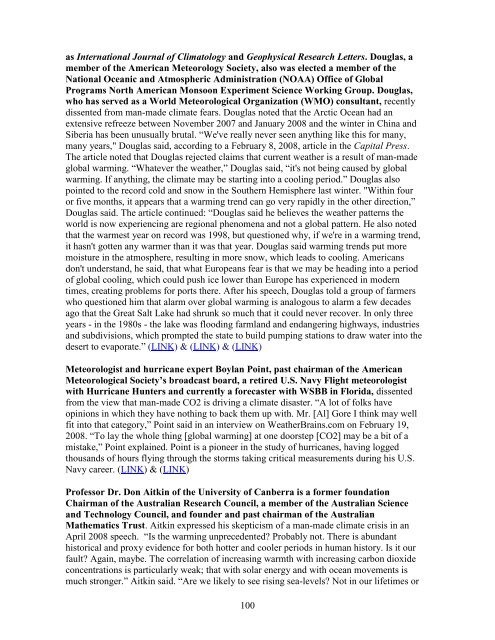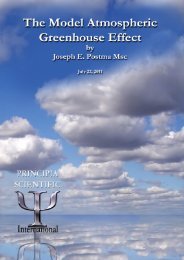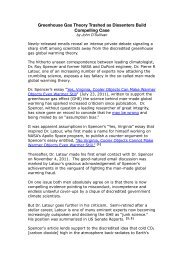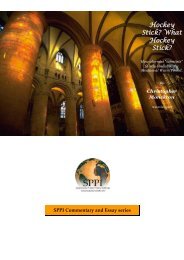Than 1000 International Scientists Dissent Over Man-Made Global ...
Than 1000 International Scientists Dissent Over Man-Made Global ...
Than 1000 International Scientists Dissent Over Man-Made Global ...
You also want an ePaper? Increase the reach of your titles
YUMPU automatically turns print PDFs into web optimized ePapers that Google loves.
as <strong>International</strong> Journal of Climatology and Geophysical Research Letters. Douglas, a<br />
member of the American Meteorology Society, also was elected a member of the<br />
National Oceanic and Atmospheric Administration (NOAA) Office of <strong>Global</strong><br />
Programs North American Monsoon Experiment Science Working Group. Douglas,<br />
who has served as a World Meteorological Organization (WMO) consultant, recently<br />
dissented from man-made climate fears. Douglas noted that the Arctic Ocean had an<br />
extensive refreeze between November 2007 and January 2008 and the winter in China and<br />
Siberia has been unusually brutal. ―We've really never seen anything like this for many,<br />
many years," Douglas said, according to a February 8, 2008, article in the Capital Press.<br />
The article noted that Douglas rejected claims that current weather is a result of man-made<br />
global warming. ―Whatever the weather,‖ Douglas said, ―it's not being caused by global<br />
warming. If anything, the climate may be starting into a cooling period.‖ Douglas also<br />
pointed to the record cold and snow in the Southern Hemisphere last winter. "Within four<br />
or five months, it appears that a warming trend can go very rapidly in the other direction,‖<br />
Douglas said. The article continued: ―Douglas said he believes the weather patterns the<br />
world is now experiencing are regional phenomena and not a global pattern. He also noted<br />
that the warmest year on record was 1998, but questioned why, if we're in a warming trend,<br />
it hasn't gotten any warmer than it was that year. Douglas said warming trends put more<br />
moisture in the atmosphere, resulting in more snow, which leads to cooling. Americans<br />
don't understand, he said, that what Europeans fear is that we may be heading into a period<br />
of global cooling, which could push ice lower than Europe has experienced in modern<br />
times, creating problems for ports there. After his speech, Douglas told a group of farmers<br />
who questioned him that alarm over global warming is analogous to alarm a few decades<br />
ago that the Great Salt Lake had shrunk so much that it could never recover. In only three<br />
years - in the 1980s - the lake was flooding farmland and endangering highways, industries<br />
and subdivisions, which prompted the state to build pumping stations to draw water into the<br />
desert to evaporate.‖ (LINK) & (LINK) & (LINK)<br />
Meteorologist and hurricane expert Boylan Point, past chairman of the American<br />
Meteorological Society‟s broadcast board, a retired U.S. Navy Flight meteorologist<br />
with Hurricane Hunters and currently a forecaster with WSBB in Florida, dissented<br />
from the view that man-made CO2 is driving a climate disaster. ―A lot of folks have<br />
opinions in which they have nothing to back them up with. Mr. [Al] Gore I think may well<br />
fit into that category,‖ Point said in an interview on WeatherBrains.com on February 19,<br />
2008. ―To lay the whole thing [global warming] at one doorstep [CO2] may be a bit of a<br />
mistake,‖ Point explained. Point is a pioneer in the study of hurricanes, having logged<br />
thousands of hours flying through the storms taking critical measurements during his U.S.<br />
Navy career. (LINK) & (LINK)<br />
Professor Dr. Don Aitkin of the University of Canberra is a former foundation<br />
Chairman of the Australian Research Council, a member of the Australian Science<br />
and Technology Council, and founder and past chairman of the Australian<br />
Mathematics Trust. Aitkin expressed his skepticism of a man-made climate crisis in an<br />
April 2008 speech. ―Is the warming unprecedented? Probably not. There is abundant<br />
historical and proxy evidence for both hotter and cooler periods in human history. Is it our<br />
fault? Again, maybe. The correlation of increasing warmth with increasing carbon dioxide<br />
concentrations is particularly weak; that with solar energy and with ocean movements is<br />
much stronger.‖ Aitkin said. ―Are we likely to see rising sea-levels? Not in our lifetimes or<br />
100





